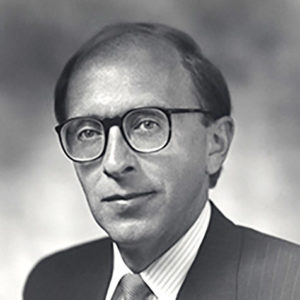calsfoundation@cals.org
David Wiley Mullins Jr. (1946–2018)
David Wiley Mullins Jr. was a prominent economist whose professional experience includes stints working in both the Department of the Treasury and as a member of the Federal Reserve Board of Governors, as well as in the private sector.
David W. Mullins Jr. was born on April 28, 1946, in Memphis, Tennessee. He was one of three children of David Wiley Mullins, who was a longtime educator, and Eula Elizabeth Harrell Mullins. Mullins’s family lived in Alabama, where his father worked for Auburn University. In 1960, his father became president of the University of Arkansas (UA) in Fayetteville (Washington County), and David Mullins Jr. attended high school in Fayetteville, graduating from Fayetteville High School in 1964. Mullins earned a BS in administrative sciences from Yale University in 1968 and then pursued graduate work at the Massachusetts Institute of Technology (MIT). After first earning a master’s in finance, he completed his PhD in economics and finance in 1974. Mullins then taught finance at Harvard Business School from 1974 to 1988. At Harvard, he served as faculty chairman of the business school’s corporate financial management program.
While still at Harvard, Mullins made a first foray into government service when, in 1987, following the October stock market crash, he served as associate director of the Treasury Department’s Brady Commission, a body charged with analyzing the crash. He was the primary author of the commission’s report. The following year, Mullins joined the administration of President Ronald Reagan, becoming the assistant secretary of the Treasury for Domestic Finance. He oversaw federal finance, financial policy, securities markets regulation, and synthetic fuel projects. Continuing to work in the Treasury Department under President George H. W. Bush, he helped develop the plan to address the savings and loan crisis. In recognition of his efforts, Mullins was awarded the department’s highest honor, the Alexander Hamilton Award. He left the Treasury Department in 1990 when President Bush appointed him to serve on the Board of Governors of the Federal Reserve, a role he assumed on May 21, 1990. He became vice chairman on July 24, 1991; on February 14, 1994, in what observers saw as a surprise move, he resigned. At the Federal Reserve, he was particularly involved with monetary policy, banking policy, and financial markets.
Mullins entered the private sector, becoming a partner in Long-Term Capital Management (LTCM), a new investment firm. His work there primarily focused on strategies related to equity and fixed income of the United States, Europe, and Japan; he was a cofounder of the firm’s investment business in Asia. The firm collapsed in 1998 and was dissolved in 2000. Mullins worked with a number of financial services corporations over the next few years. In July 2004, he became chief economist of Vega Asset Management, although he spent the majority of his time as the managing director and chief economist for Azimuth Trust. He also served as chairman of the board of Simplify. In 2008, he was an economic advisor for Republican presidential nominee John McCain.
Mullins lived in Connecticut, not far from New York City, but he maintained ties to Arkansas through continued ownership in a farm that his father had bought early in his own academic career. He died on February 26, 2018, in Naples, Florida, following emergency heart surgery.
For additional information:
“David W. Mullins Jr.” Federal Reserve History. http://www.federalreservehistory.org/People/DetailView/24 (accessed October 6, 2020).
Interview with David W. Mullins Jr. Federal Reserve Bank of Minneapolis, September 1991. https://www.minneapolisfed.org/publications/the-region/interview-with-david-w-mullins-jr (accessed October 6, 2020).
William H. Pruden III
Ravenscroft School
 Business, Commerce, and Industry
Business, Commerce, and Industry Divergent Prosperity and the Arc of Reform, 1968–2022
Divergent Prosperity and the Arc of Reform, 1968–2022 Politics and Government
Politics and Government David W. Mullins Jr.
David W. Mullins Jr. 




Comments
No comments on this entry yet.